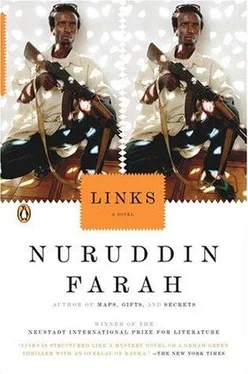“Her last words?”
“She was happy to go, when her time was up,” the woman repeated, with more care this time, and added: “But she was very sorry that you, her only beloved son, weren’t there to bid her good-bye.”
They lived in a world of pretense, the two of them. He talked with caution, well aware that his life depended on it. She spoke to please Af-Laawe; most definitely she feared him too. But Jeebleh had to set a test for her, to see if she was for real.
“Like many Somali children,” Jeebleh said, “I never knew my mother’s age precisely. Would you by any chance know?”
“She was close to seventy.”
“When she died?”
Af-Laawe stepped in. “If we had her papers we would be able to answer your question with more precision.”
His mother had had a strong and youthful spirit, and had been more together in mind and body than many others of her advanced age. Jeebleh knew that although she may have appeared younger, she was actually in her early eighties when a housekeeper was hired to look after her.
The woman, contradicting an earlier statement of hers, said, “She wanted so much for you to return before her final departure, and as I said earlier, she was sad that she had to go.”
He pictured her in his mind, a hardworking and determined woman, prepared to outlive the Dictator. She wouldn’t have been happy to go without seeing her son. In fact, on the few occasions when he had called on the neighbor’s line, she would tell him that she would preserve herself until he came home. Now that he remembered the phone calls, it struck him that this woman was not the person to whom he had spoken when he had telephoned: that woman had had a local accent, while the woman in front of him had a more pronounced accent from the north, probably from Galkacyo.
He had seldom written to his mother, and was cautious when he did. Not only did he think there was no good to be gained from raising her expectations, but he did not want to cause her unnecessary distress. She never sounded keen on the idea of having his wife and two daughters visit. “What will I say to them?” she asked once. “I don’t speak a foreign language, and you haven’t taught them Somali.” And when he spoke to her again, asking her to think further about it, she said, “It’ll only worry me to no end if they come. Besides, I won’t be able to sleep a wink, night or day, expecting a knock on my door, and waiting for someone from the National Security to harass us.” She was a woman with an agenda, the preservation of her son and Bile, whom she loved as though he were hers too.
Jeebleh asked the housekeeper to tell him what his mother thought about his unannounced departure from Somalia.
“I don’t like to hurt your feelings,” she replied.
“How do you mean?”
“Your mother died believing you were a traitor.”
He knew the woman wasn’t telling the truth, and was sure she had been told to say this. He shifted his gaze away, refusing to look in her direction for a while. When he had her in his sights again, he asked, “How often did Caloosha visit her?”
It was her turn this time to appear drained of blood, her face becoming pallid. “I don’t wish to get involved,” she said.
“What do you mean, you don’t wish to get involved?” He pretended to be enraged. “What has my question got to do with your getting involved ? Involved in what ?”
He knew and she knew where he intended to take her with his questions. And he understood why she didn’t want to go there with him, to a land of further attrition. Af-Laawe, he noticed, was agitated again. Jeebleh decided to interrogate her further. “Did my mother suffer any lapses of judgment?”
“Why do you ask?”
“Because I doubt that she would think of me as a traitor, unless she had suffered great lapses of judgment.”
“I wouldn’t know.”
“Did she die fully alert?”
He had been kept so ill informed about her state of health that he did not even know about the deterioration until she was just about dead. He had seen this as symptomatic of a country whose people cared little about one another. On the one hand, there was deliberate indifference to her condition on the part of the state apparatus, because she was his mother. On the other hand, there was an incurable apathy everywhere. Someone like Shanta, who had visited the old woman and in all probability looked after her now and then, still hadn’t stirred herself sufficiently to show that she cared, by writing to him.
He and his mother had never talked about his departure from Somalia: it would have been unwise to discuss his controversial one-way ticket out of the country on an open telephone line belonging to a neighbor. He had heard of his mother’s deteriorating health, and tried to telephone, but could not get through because of the bad connections. Then he received a newspaper clipping, anonymously posted, in which her death was announced. Now he repeated, “What was my mother’s mental state when she died?”
“Your mother died on her own terms,” she said.
“She was fully aware of what was happening?”
The woman nodded.
He imagined Caloosha calling on his mother, sitting at her bedside day in and day out, and describing her son as a traitor. Could she, in truth, have seen as a traitor someone who belonged outside the precincts of the human community? No. He knew she wouldn’t have thought of him as a Judas. Alas, he had no one to support his side of things. His voice as hard and unbending as iron, he asked, “What about my letters to her? Why were they returned, unopened and unread?”
“I’ve no idea about letters’ being returned.”
“You weren’t aware?”
“I read her the ones I received!”
“What did you do with them?”
“Burned them.”
“Why burn them?”
“Those were my instructions.”
“Who gave you those instructions?”
“She did!”
If this was true, then it could only mean that his mother had attained the bitter age when nothing hurtful could have touched her anymore. He had failed her, and was blaming others for his foibles: that was the sad truth of it. He had come too late. What in hell did he expect in a country weighed down with the grievances of its people, dwelling in a land burdened by destruction and death? His own letters returned, unread? Now he asked, “Were you alone with her when she died?”
“We weren’t alone.”
“Who else was there with you?”
“Caloosha!”
She would give no further details, and resorted to shaking her head back and forth, then up and down. She paused for a brief spell, then shook her head now to the right and now to the left, in the gesture of someone ridding herself of a terrible thought.
Jeebleh imagined his mother dying, and then total quiet descending, a butterfly no longer stirring, with its wings folded, still.
He heard Af-Laawe say, “Now to the cemetery!”
ON THEIR WAY THERE, JEEBLEH UNDERSTOOD THAT HIS MOTHER HAD DIED restless. It no longer mattered to him whether the woman now sitting behind him in the Mercedes, next to Af-Laawe, had served as her housekeeper or not; nor did it matter if she had lied to him. He and his mother hadn’t ultimately made peace with each other. His visit to her grave and his wish to build a headstone were but attempts to effect reconciliation with her spirit, which had departed in a troubled state.
He assumed that Af-Laawe and Caloosha would feed him half-truths and apparent facts. Having bothered to bring him all the way to the cemetery, they would probably show him a tomb marked with a board bearing his mother’s name. Thanks to Shanta, he knew what to look for: a Hinducini mango tree with seasonal fruits bigger than the head of a grown man, and four medium-to-large stones with his mother’s name on them. He sat between two men in shades, with guns.
Читать дальше












